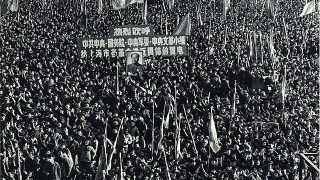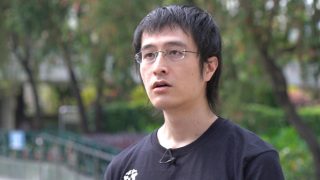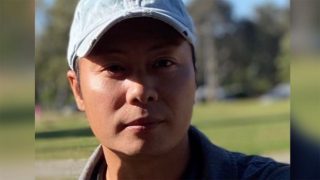The CCP claims to have won a “great victory” against COVID-19 thanks to “great leadership” and the socialist system. Those who took part in the fight disagree.
by Han Sheng
Amid the coronavirus pandemic, CCP has set the propaganda machine in motion to demonstrate at home and abroad that the deadly virus is being defeated only thanks to China’s “great leadership” and “the superior socialist system.” State-controlled media continue to boast about the efficiency and speed the country’s leaders reacted to the epidemic, building huge hospitals “in days and with high efficiency rare in the world” and dispatching tens of thousands of medical personnel to Wuhan in record times, “relying on its strong social mobilization and organizational capability.” The news rarely missed an opportunity to mention that other countries were struggling with shortages of hospital beds, personnel, and medical supplies.
In April, the official media ran a series of articles, “Xi Jinping’s Art of Fighting the Epidemic War,” singing praises to the country’s president on his leadership combating coronavirus. But at what price? Judging from testimonies of people who were part of the “great power defeating the epidemic,” the alleged “victory” came at the cost of severe violations of citizen’s fundamental human rights.
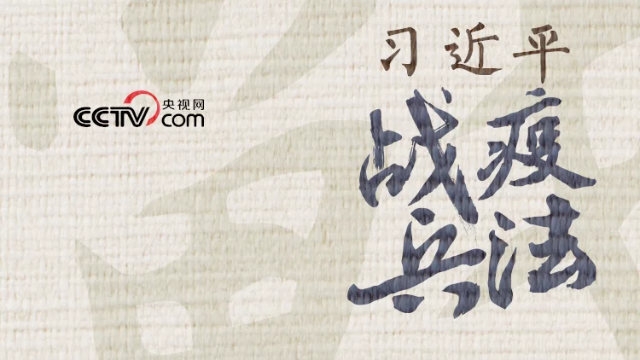
Medical workers intimidated and threatened.
A doctor working from the central province of Henan revealed to Bitter Winter that in February, his hospital received an order from the local Health Commission, demanding to dispatch medical personnel to Wuhan, the epicenter of the epidemic. “Our superior said that the government would blacklist us if we refused to go, our descendants and we would be restricted to do many things in the future,” the doctor said. “After naming the personnel to be sent to Wuhan, the hospital gathered them and prohibited them from going home, fearing that they would escape. They then were sent to a designated site to wait for the transportation to Wuhan in the afternoon.”
A doctor in her 30s from Taizhou, a prefecture-level city in the eastern province of Zhejiang, was too assigned to go to Wuhan. Since she had two small children, she asked her hospital to be relieved from the duty so she could take care of them. But the hospital administration not only refused her request but also threatened to dismiss her if she didn’t go.
Villagers and impoverished CCP members forced to make donations.
In response to the call from the CCP’ s Central Committee, most of its members throughout the country actively donated money to show their support for the government’s measures to prevent and control the coronavirus outbreak. By the end of March, nearly 80 million Party members “voluntarily” donated 8.26 billion RMB (about $ 1.2 billion) for “big and key projects.”
According to a government employee from the Wendeng district of Weihai, a prefecture-level city in the eastern province of Shandong, the local authorities implemented a scoring donation system to collect coronavirus relief donations. Ten points were given to those donating 100-1000 RMB (about $ 14-140), 20 points for donations from 1,000 to 3,000 RMB (about $ 140 to 420), and so on. To ensure that people give money, village officials threatened to “blacklist those who refuse to make donations.”
On March 6, government officials in a village under the jurisdiction of Jingzhou city in the central province of Hubei went from home to home to collect donations. Many people, especially from impoverished households, were confused as to why they were forced to give money to the government. “What are these donations for?” asked one villager. “I live in the province most affected by the virus. Still, the government not only does not help me but asks me to donate to it.”
On February 17, a government official from Shandong’s Weihai city came to the home of an elderly Party member who is unable to take care of himself after a car accident and urged him to give a donation. Another CCP member from Weihai, in his 90s, was forced to ask his daughter to donate on his behalf on March 5.
In late February, an official in a village of Duchang county in the southeastern province of Jiangxi threatened a villager to expel his son from the CCP if he refused to donate money.
Such tactics, forcing people to prove their loyalty to the state with “voluntary” donations, are often employed by the CCP during relief and rescue operations.
Migrant workers, who built hospitals in Wuhan, exploited and silenced.
According to a Radio Free Asia report, migrant workers who built Vulcan Mountain and Thunder Mountain Hospitals in Wuhan to house coronavirus patients, found themselves in a pickle after they learned that the government and intermediaries exploited their salaries. When they tried to defend their rights, the local authorities suppressed them in the name of “stability maintenance.”
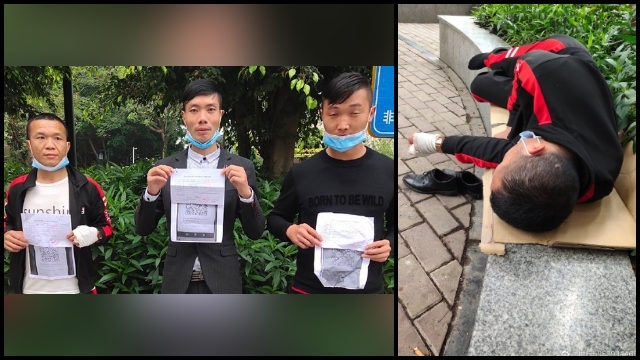
A worker who took part in the construction of the Thunder Mountain Hospital in Wuhan posted a comment online that the state-run China Railway No. 3 Engineering Group Co., Ltd. refused to pay salaries to workers. Officials made them delete videos and photos of the hospital and sign statements promising never to mention its construction. With no money and accommodation, unable to return home, the workers were left on the streets of Wuhan.
In mid-February, a prison in Shandong’s Jining city recruited migrant workers to build temporary isolation quarters, promising a salary of 1,500 RMB (about $ 200) for each person per day. But, according to an inside source, the workers were never paid the promised sum. Moreover, they were never informed that some inmates had already been infected with the coronavirus. The prison also forced the workers to sign confidentiality agreements promising not to reveal any information.
Source: Bitter Winter
